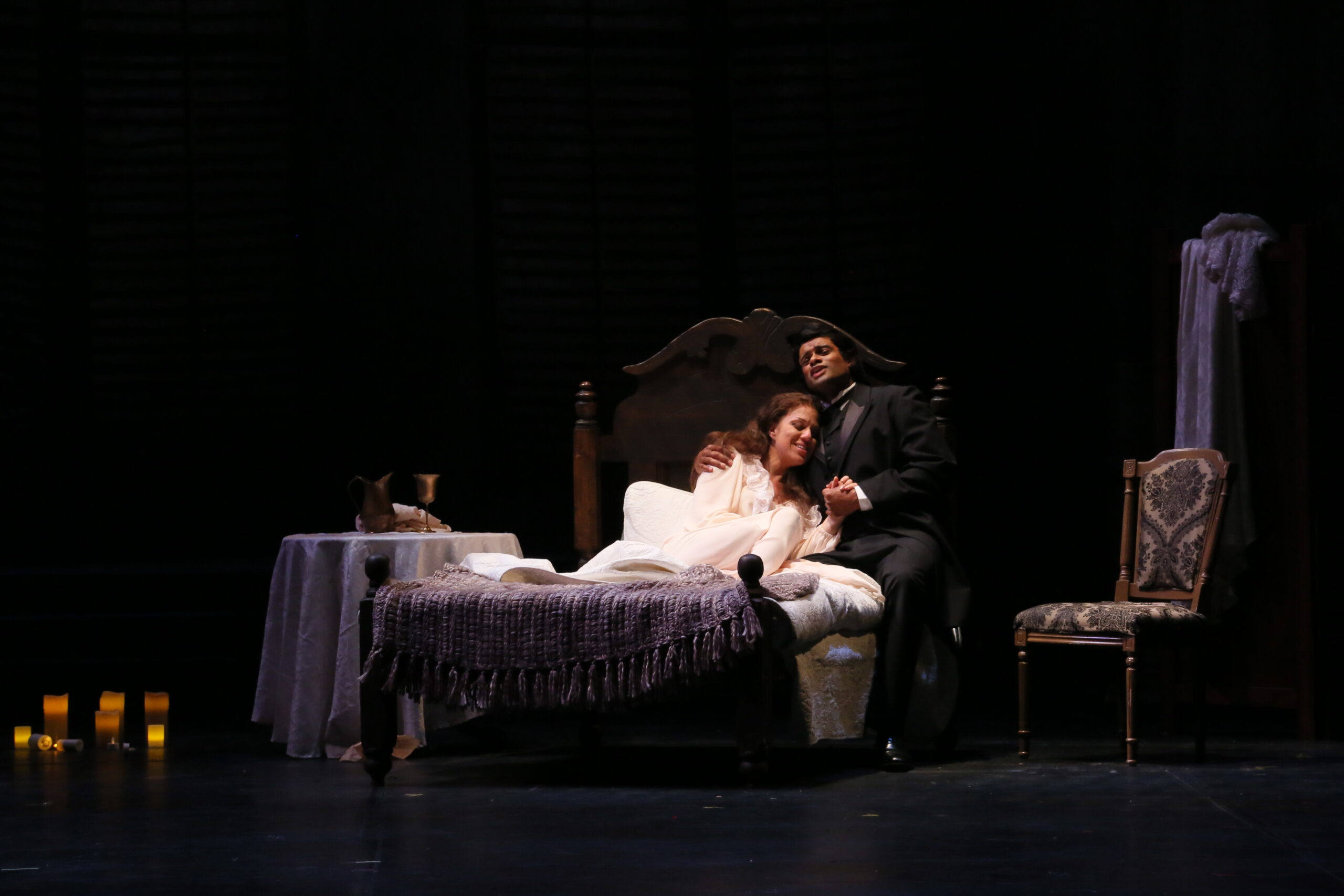In the first act of La Traviata, you’ll encounter more memorable melodies than you’ll recognize in most full-length operas. Two of them, the ultra desirable Violetta’s giddy “Sempre libera” and her earnest admirer Alfredo’s “Un di felice,” intertwine hauntingly as the curtain comes down. Yes, the wily courtesan is vivaciously determined to live for pleasure, but the passionate throb of Alfredo’s sincere love – and her own fatal illness – are changing her resolve. The other two songs, the “Libiamo” drinking song and the reflective “Ah, fors’é lui che l’anima,” present a similar contrast. But it’s Alfredo who launches the lively toast and Violetta who registers the grip of love. Both of our protagonists, then, are not merely delivering arias many of us know well, they are traversing a considerable range of moods and emotions as they sing. Presenting Traviata for the tenth time in their 69-year history, Opera Carolina faced a couple of perennial challenges at Belk Theater: making sure that their current production lived up to the intense expectations packed into Act I and then ensuring that the two acts afterwards weren’t anticlimactic.
Although soprano Elizabeth Caballero and tenor Sean Panikkar were quite satisfying in kindling the music and romance of the opening soiree, conductor James Meena and stage director James Mavel made substantial contributions throughout. Meena beautifully bridged the sorrowful and the ebullient as he led the Charlotte Symphony through the overture and into Violetta’s salon. Instead of subtle crescendos when we reached the “Libiamo,” there were abrupt jumps in Meena’s dynamics, simulating the pulsations of the zesty party revelry. Prefacing Act III, Meena coaxed a luminescent anguish from the violins as the curtain rose on Violetta’s gloomy deathbed. Mavel used the Belk stage resourcefully and pointedly, bringing his singers – Violetta and Alfredo in Act I and Violetta and Alfredo’s father in Act II – to the same stage-right spot for the tenderest a cappella moments of their duets. The director also decreed a little more melodrama than I’m used to seeing in Traviata, calling upon bass-baritones Dan Boye as Baron Duphol, Violetta’s patron, and Reginald Smith as Germont, Alfredo’s father, to amp up their anger and forcefulness.
Since the Sunday matinee audience was disinclined to award bravos to either of the lovebirds during their Act I pyrotechnics, it was helpful to remind us that there were other obstacles blocking Alfredo’s bliss aside from Violetta’s frail health. It seemed churlish to withhold a lustier ovation for the “Un di felice” duet, particularly since Caballero and Panikkar had such genuine chemistry, but there were perceivable shortcomings in their solo work. While Pannikar cut a handsome, elegant figure as Alfredo, authentically solicitous toward Violetta, his richly voiced solos didn’t quite have the fervor that melts hearts. Caballero had vitality and emotion aplenty but sometimes lacked simple vocal agility. While her “Ah, fors’é lui” warranted more clamor from the crowd, the smoothest, most carefree coloratura passages of “Sempre libera” were disappointingly choppy and careful.
Smith stormed into Violetta’s country home so malevolently that I feared he was too fierce and over-the-top for the softening that must follow. But he bridged the gap quite convincingly when Violetta discreetly showed Germont that, contrary to his presumptions, it was Alfredo who was sponging off her. After Germont’s pleadings on behalf of Alfredo’s betrothed sister and his family name failed to convince Violetta to leave Alfredo, Smith achieved his greatest triumphs of the afternoon. Gnawing at Violetta’s lingering sense of unworthiness, Germont broke down her resistance by arguing that his fickle son would eventually tire of their unconsecrated love. With Germont’s cruel duplicity, the drama took on new gravitas, but we quickly segued into poignancy and sentimentality in the “Dite alla giovine” duet as Violetta made Germont promise that he would someday tell Alfredo of her sacrifice. Verdi may milk this bittersweet conciliation more than necessary, but the teamwork of Caballero and Smith made it shine. After Alfredo returned and found himself abandoned by Violetta, Germont outdid himself in hypocrisy, comforting his son amid his sorrows – while Smith outdid himself in the powerful “Di Provenza il mar” aria, drawing the first bravos of the afternoon.
Lloyd Evans’ set design was nothing like the surreal concept that caused such a stir at the Metropolitan Opera when general manager Gelb decided that aping the Europeans would sell more tickets to millennials. It’s comfortably retro – but not lavishly so. Violetta’s salon made a respectable splash, and the exterior of her country home breathed a floral, bucolic flavor. The party scene where Alfredo gambles recklessly against Duphol and wrongly insults Violetta by flinging his winnings at her feet – sparking a challenge from Duphol to a duel – should be taking place at the party that Violetta was invited to in the previous scene. Or if we were following Alexandre Dumas’s Lady of the Camellias script instead of librettist Francesco Piave’s deft adaptation, we’d be at a casino, the most logical setting for the Alfredo-Duphol confrontations. Instead, Evans returned us to virtually the same room that served as Violetta’s salon, dominated by the same winding staircase for the separate entrances of the estranged lovers.
Most jarring for me was the Edward Gorey darkness of the deathbed scenery, not at all dispelled when Violetta’s maid was instructed to open the drapes at dawn. Later in the scene, when music from a carnival wafted into the room, the contrast between effervescent life and oncoming death – ever-present since the curtain first rose two hours earlier – hardly seemed to register. The melodramatic strand that Mavel emphasized at strategic points in the action now seemed to take over. Yet here was precisely where the restraint of Caballero and Panikkar were most effective, fortified by the solemnity of the occasion. Moments when Violetta gave Alfredo the locket from around her neck, showed him the cameo of herself within, and told her beloved that she would look down kindly upon him from heaven when he wed his future wife – each one of these moments was more moving than any Traviata that I could recall. Dignity and anguish from both protagonists blended touchingly in the final throes of their torment.


